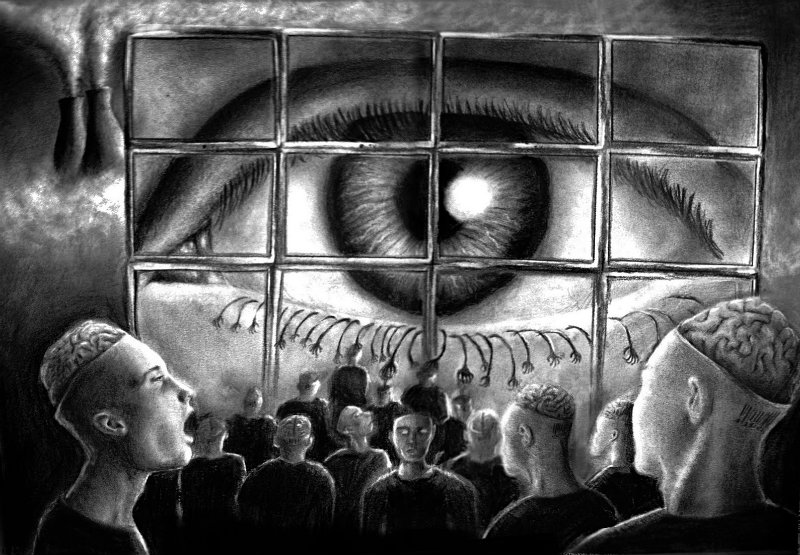
The first thing an infant learns is to see, move and manipulate the parents. We absorb the ability to manage people with mother's milk. If you shout loudly, they will feed you, if you gag with tenderness, they will kiss you. Strategies evolve with age.
But there are people who have achieved perfection in manipulation. They manipulate how they breathe. For them, this method of communication ceases to be a means, but becomes the only communication channel. Everyone suffers from this unhealthy behavior.
This newsletter will be useful for those who would like to break the vicious circle of "manipulator - victim" and make their relationships with others healthier, more harmonious and effective.
Office magic
Manipulation is an illusion. You are a fool, summoned from the hall under the bright rays of the spotlights. If the magician said that the dove is up your sleeve, so it will be. The illusionist is your opponent. He is always right and all in white. Whatever you do, he has it planned.
For the second month, manager Alina has been asking manager Masha to replace her in the store on weekends. Every time Masha wants to refuse, Alina talks about a difficult period in her life, her recent separation from her boyfriend and a sick cat.
If Masha sharply refuses, the next day all employees will condemn her for "cruelty."
If it comes out again for replacement, it will be considered a rag.
Manipulation, like any trick, only works if you distract the viewer's attention. Therefore, it is difficult to realize that you are being manipulated.
There is nothing dangerous about helping a colleague. But you need to stop in time before you sit on your neck.
In the famous book Games People Play, American psychiatrist Eric Berne described three types of manipulators: Victim, Savior, and Aggressor.
His student Stephen Karpman combined these types into a relationship triangle. Research has shown that any person who succumbs to manipulation becomes one of the figures in this closed loop.
The victim suffers, the Savior tries to help her. The victim needs more and more help and becomes the Aggressor. And the Savior turns into a Sacrifice. If everything is left to chance, each member of the triangle turns into a manipulator.
The Stockholm Syndrome occurs - a state where the hostages begin to sympathize with the terrorists. And the one who suffers from manipulation can no longer exist without it.
Sleight of hand
It is useless to catch a manipulator on a "hot" one. Manipulation is based on momentary illusion and leaves no evidence or witnesses. You cannot prove that the magician was bluffing even if you catch him by the hand. The magic can only be dispelled by determining how focus works.
Any manipulation parasitizes on three principles:
- pseudological connection,
- low self-esteem,
- lack of evidence.
Incorrect logical chains were popular even among the orators of Ancient Greece. Sophists - paid eloquence teachers - became famous for convoluted evidence, where individual theses were not always linked to conclusions.
The thief only takes good things. Striving for good is good. So stealing is a good thing.
We are used to the fact that proofs are followed by a conclusion, individual examples create a general rule. Therefore, in complex reasoning, we easily overlook the violation of communication.
The manipulator takes advantage of this. Attention scattered, and we no longer noticed from which sleeve the card appeared.
Pasha works in the advertising department, Misha works in the customer service department. Pasha was assigned to make a presentation on the sales of a new product. He calls Misha and says that Misha must send him a sales schedule and a diagram of buyers by age, gender and place of residence - without this information, it is impossible to develop advertising proposals.
Since the presentation is needed by the authorities tomorrow, Misha will have to postpone his business and do some research. Misha will help Pasha, he did not notice that the cause is not connected with the effect.
The fact that there is no presentation without information does not mean that Misha should draw the diagram. Pasha can do this according to the data provided.
We successfully complete the missing logical connections ourselves. And we feel guilty if we do not have time to do the work for others. We will always find something to reproach ourselves with. And the manipulator takes advantage of this.
Projection is shifting one's flaws onto others. The manipulator blames us for everything. And we are ready to agree, because we ourselves do not give ourselves a descent.
The more attentively you look inside yourself, the less you look around and do not notice the control from the outside.
Pathological liars often accuse their victims of lying.
Non-punctual people are the loudest about being late.
Bad workers have “ineffective bosses”.
Problems at work are blamed on “terrible” colleagues, not their own incompetence.
It is difficult to knock the ground out from under the feet of a self-confident person. So, you need to make him doubt.
Before an attack, manipulators often carry out "love bombing". Praise and idealize you until you take it for granted, and then only begin to celebrate your mistakes. Not understanding what has changed, you start digging in yourself and dig a hole yourself.
Gaslighting is a form of psychological violence that makes the opponent question the reality of what is happening.
The term appeared in 1944 after the release of the American movie Gas Light. According to the plot, the heroine was driven to madness by the barely noticeable flickering of gas lamps.
“It seemed to you,” the interlocutor says. People are really prone to make mistakes, to perceive reality subjectively. You really could only think that a colleague is playing against you. It is impossible to check whether you are wrong or not.
Manipulation most often occurs in words. Only your opponent knows the truth, and he claims that he is sinless.
Such people are constantly checking other people's boundaries: exploring how far they will be allowed to go. The more they get away with it, the more they attack.
If the victim manages to escape, the manipulator will apply the "vacuum cleaner technique" - change the appeal and start making friends, making small gifts and by any means pulling the victim back into the web of influence.
The wrong side of the trick
The manipulator's job is to get you to make a decision that is beneficial to him. Just as Woland taught Margarita never to ask for anything, so the manipulator wants to get what she wants, but not give a specific order.
German psychologist Frederic Perls believed that manipulators act unconsciously: not trusting people, they try to control them.
Sociologist Erich Fromm called this the need for proven love - when loyalty needs to be constantly reaffirmed.
This does not mean that the manipulator is in a leading position. Raising a white flag means forcing an enemy ready for war to accept a truce.
If you notice that you are being persuaded to make a decision, ask politely again about it directly.
If your opponent convinces you that it seemed to you, then there is an official reason not to adhere to this position.
You can save yourself from manipulation by reciprocal manipulation.
The manipulator needs something - pretend that you do not understand, and he will have to move on to active actions that will give him away.
Agree without specifying, repeat a polite refusal, "mirror" the enemy's action. The main thing is not to overdo it and not become a "monster" yourself.
Being a manipulator is bad. But not because this style of behavior is condemned by society. The manipulator loses touch with reality and does not know any other tactics to achieve what he wants.
Manipulation is impossible without fraud, lies, the theater of one actor. And it is very difficult to break out of this swamp.
According to the American psychologist Abraham Maslow, the complete opposite of the manipulator is the actualizer.
This is a free, open and healthy person. She achieves her goal with "clean" methods and does not add dependency to people.
Manipulators reasonably do not trust people. People are not intuitively ready to voluntarily support the manipulator.
The sins on which the manipulators parasitize - low self-esteem, insecurity - are equally related to themselves.
The manipulator lives in a state of constant war with the world. Being a manipulator is bad because it is not profitable. The cost of managing people is much greater than the return itself.
Top hat, rabbit and magic wand
The art of manipulation, like the art of illusionists, has been honed over the years.
Manipulation can be of different scales - you can change public opinion at the country level, you can control boyfriends within the sandbox. There are many receptions.
There is only one weapon against them: no matter what tricks and tricks are shown to you, be sure of your own position.
Social proof method. They want to convince you that the correct answer is the majority answer. Abstract, weigh the pros and cons, take responsibility for the decision.
The transition to personalities. Opponent calls not to believe your professional experience because of your appearance / personal status / character traits. Do not react to jabs and politely return the conversation to the area of professional discussion.
Reciprocal exchange rule. You are being rendered a small favor, which you did not ask for, in order to make you a debtor. Accept the gift, but remember that you yourself are helping the person feel like a rescuer. So you are quits.
Benjamin Franklin Method. You are asked for little help and are disproportionately thanked to make you feel like a benefactor and treat the petitioner with condescension. Provide help for free. Patronage is a form of destructive pride.
Emotional explosion. You are thrown out of emotional balance and then forced to make decisions. Take the time and give an answer only when you are able to adequately measure risks and calculate losses.


